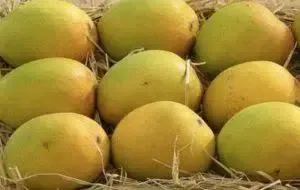How Are Dindigul Mango Farmers Coping with Price Plummets?

Synopsis
Key Takeaways
- Price drops for mango varieties have severely affected farmers.
- Government intervention is crucial for recovery.
- Climate change has impacted mango yields significantly.
- Farmers are calling for regulatory changes to improve market conditions.
- Empowering FPOs can help farmers bypass middlemen.
Dindigul, June 26 (NationPress) Mango farmers in the Tamil Nadu region of Dindigul are facing a significant decline in the prices of essential mango varieties, leading to distress and urgent calls for governmental assistance. The varieties most impacted include ‘Neelam’, ‘Bangalura’, and ‘Senthuram’, which are widely grown in Ayakudi, Gopalpatti near Natham, and Andipatti village in Palani taluk.
At present, the popular ‘Bangalura’ variety, commonly used in beverage production, is selling for a mere Rs 4 per kilogram, a sharp drop from its typical price of Rs 12 per kg. The price of ‘Neelam’ has decreased to Rs 25 per kg from Rs 50, while ‘Senthuram’ has fallen from Rs 30 to just Rs 10 per kg.
Surajendran, a farmer in Gopalpatti, stated, “We are left with no choice but to either dispose of the fruit or stop harvesting entirely.”
He noted that while last year's yield was over 90 percent, this year it has dropped to just 40 percent due to unpredictable weather patterns and climate change.
R. Sachithanantham, MP from Dindigul, has reached out to Union Agriculture Minister Shivraj Singh Chouhan, emphasizing the crisis faced by mango producers. “Last year, farmers earned up to Rs 18,000 per tonne for high-quality mangoes. This year, prices have plunged to Rs 4,000 per tonne. At the same time, input costs have risen sharply,” he pointed out.
He highlighted that the absence of cold storage facilities and the lack of processing infrastructure, such as mango pulp manufacturing units, have exacerbated the crisis.
He has urged the Centre to take immediate action through market support mechanisms under the PM-AASHA scheme and infrastructure development support under the Mission for Integrated Development of Horticulture (MIDH).
Farmers are also advocating for the enforcement of the 20 percent natural fruit pulp compliance norm for beverage manufacturers, replacing chemical substitutes with genuine fruit content. They have called on the government to empower Farmer Producer Organisations (FPOs) to avoid exploitative middlemen and to establish a regulatory framework to dismantle pricing syndicates.
Sachithanantham emphasized that prompt government measures to stabilize mango prices, deliver direct financial aid, and enhance post-harvest infrastructure under schemes like MIDH and APEDA could save farmers from disaster this season.









